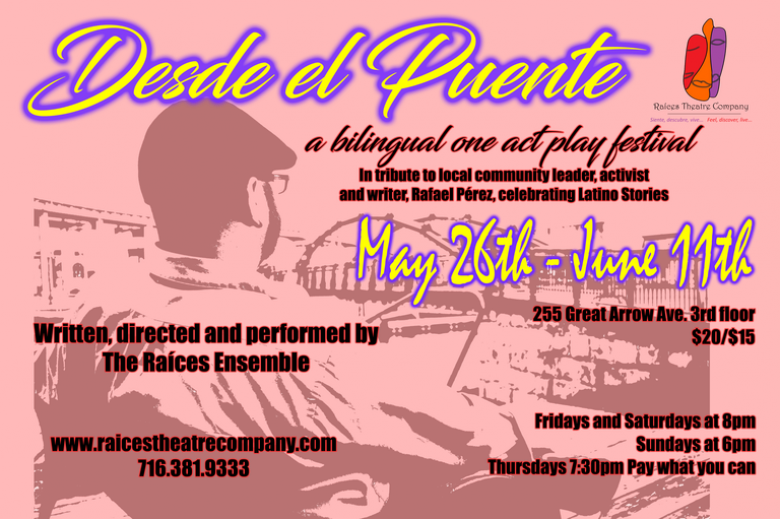“What does it mean to be Latino?” That is the question of identity asked and answered with great feeling by a young man in the last of the ten short plays in Desde el Puente, the second annual bilingual one-act play festival by Raíces Theatre Company currently playing at the Manny Fried Playhouse. All of the plays are written, directed, and performed by members of the Raíces Ensemble, and the festival is a tribute to local community leader, activist and writer Rafael Pérez, celebrating Latino stories.
Each of the plays delves into different facets of life as a Latino in America. They are comedic, joyful, satiric, dramatic, and deeply heartfelt. In the Artistic Director’s Note, Victoria Pérez states that in reviving Raíces in 2012, she felt “a responsibility to tell our stories, to reflect our experiences on stage…the conversations start, the realizations start, we see ourselves lifted up instead of in the stereotypical ways in which we are depicted.” The plays offer a window into the lives and experiences of our neighbors who feel the sting of ethnic and racial prejudice, and also into the warmth, love, richness, and humor of Latino culture.
I speak very little Spanish, so I was amazed and very pleased to find that I understood what was happening in each of the three plays in Spanish. That speaks to the quality of the acting, and also to the fact that human experience often transcends language barriers. My friend speaks fluent Spanish, so I asked her a few questions between plays, which is something any of us uni-lingual folk can do. Just ask your neighbor.
In the comic El Muerto (The Dead One), written by Dewel Pérez, as the grieving widow sobs on the body of her dead husband, another woman appears, and later a third person. It was very clear what El Muerto had been up to before his untimely passing. The word puta was uttered several times and as I can swear in several languages, I got that one straight off.
In Tradición, written by Smirna Mercedes-Pérez, the mother wishes to pass on to her daughter, who is in college, the tradition of making pasteles that she learned from her mother. She tells her daughter about her early life in Puerto Rico. The story includes a latrine, a frog, and a cockroach, and speaks to the differences in life experience in the generations of the family. The wish of the mother to hand down to her daughter the traditions of the family is universal, and expressed with a feeling that everyone can understand.
The first of the one act plays is Application, written by Marta Aracelis. A woman stands in supplication talking to a disembodied voice that sounds a lot like the Great Oz before the curtain was pulled. She tells the voice that she used love as leverage and her kids as ransom, and that she wants a chance to change all of that for them. Where is she, and who is the voice? Hmmm...
In Anniversary, written by Victoria Pérez, three women are sitting on toilets in bathroom stalls at a “nasty” nightclub. They are strangers, but through their conversation we learn about each of their lives as they learn about each other, and understand how women bond and care for each other, and how important and empowering that is in the lives of women. And they are all hot for John Leguizamo.
America Habló, written by Dewel Pérez and Victoria Pérez, takes place on election night 2016 as two anchors at a bilingual TV station gradually realize as the states report returns, that yes, the unthinkable is happening. Donald Trump will be president. There is much weeping and gnashing of teeth, and a flask. This in itself is very funny and very well done, but the blonde pint-sized surprise at the end is more than worth the price of admission.
Pa que tu lo sepas (Just so you know), written by Alejandro Gabriel Gomez, is the final play of the evening, and his monologue about his identity is a clear and profound statement on the meaning of being Latino. His sadness at feeling like an outsider “no matter where I go,” being “too Latin” for his white friends, and "not Latin enough" for his Puerto Rican family, not knowing Spanish, or ever having been to The Island, leaves him at odds with himself, his family, and his culture. How he finds himself through listening to the wisdom and experiences of his teacher is beautiful to watch. And it is a perfect ending to this first-rate evening of theater.
The sets by Rolando E. Gómez and Carlos Maggiolo are simple and utilitarian, and work very well for each of the plays. Lighting is by Kurt Schneiderman.
The Raíces Ensemble Members are to be commended for their writing, directing, and acting. They are: Victoria Pérez, Rolando M. Gómez, Steve Brachmann, Marta Aracelis, Ingrid Córdova, Alejandro Gómez, Roland E. Gómez, Carlos Maggiolo, Rafael Mencia, Maria Pérez-Gómez, Smirna Mercedes-Pérez, Dewel Pérez, Rafael “Lito” Pérez.
Kudos to all. You can see it at the Manny Fried Playhouse (288 Great Arrow) at 8:00pm on Fridays and Saturdays and at 6:00pm on Sundays through June 11th. There will also be Pay-What-You-Can performances on Thursday, June 1st and June 8th at 7:30pm, followed by a talkback with the ensemble.

